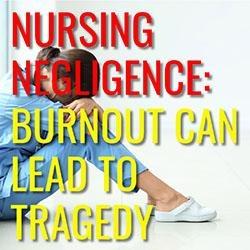Nursing Negligence: Hospital Burnout Can Lead to Tragedy

The normal juggle of life and daily high-stress situations are what many people in the medical field face. Because any wrong move could cost a patient’s life, nurses are always in a state of fight or flight.
Long-term stress often results in nursing burnout, and in turn leads to nursing negligence, a type of medical malpractice.
Medical Errors: 3rd-Leading Cause of Death in the U.S.

When people seek medical treatment, they do so with faith that everything goes well. Yet, medical errors do happen.
A recent study revealed that the 3rd-leading cause of death in the U.S. is a medical error. It is a form of medical malpractice, following heart disease and cancer.
Overlooked factors that could lead to a medical error
Patients in New York and throughout the country could be exposed to a wide range of medication errors. These mistakes could result in a worsened condition or other negative consequences. However, not all types of errors are accounted for unless there is an adverse event. For instance, many medical offices and hospitals use electronic health records. One problem that can occur is ordering medication for the wrong person.
NPA’s quarterly report shows increase in pharmacist errors
The National Pharmacy Association has released its quarterly report on patient safety errors among community pharmacists. The three-month period between April and June 2018 has seen a startling 64 percent increase in the number of such errors compared to the previous quarter. Patients in New York will want to know what some of the factors are.
Errors with electronic health records vary across systems
A study published in the Journal of the American Medical Informatics Association indicates that the reliability and usefulness of electronic health records may vary widely across different systems. EHR error rates also varied among the different tasks physicians were asked to perform, and were as high as 50 percent for certain tasks. That could be important information for New York patients.
IV drug shortages can result in medical errors
In New York hospitals, drug shortages can be a major obstacle. When there are shortages of certain drugs, medication errors may be more likely to occur, especially if they have an impact on the methods for compounding sterile products. Establishing preparedness processes and best practices can help ensure that hospitals are prepared for shortages and able to mitigate any errors these shortages could potentially cause.
Antibiotic overuse can harm care facility patients
People in long-term care facilities in New York and around the country can be at particular risk of harm due to medication errors and the improper prescription of antibiotics. In particular, when antibiotics are used improperly to treat urinary tract infections, patients can be put at elevated risk of harm, especially due to the emergence of antibiotic-resistant pathogens. These types of antibiotic-resistant bacteria pose a major threat not only inside long-term care facilities but to overall public health.
Infusion errors account for over half of adverse drug events
The vast majority of people who enter hospitals in New York will receive an infusion during treatment. The ECRI Institute, an independent nonprofit organization that promotes improvements in patient care, identified infusion errors as the top source of medical technology errors in 2017. Every year, 1.5 million adverse drug events afflict patients, and 54 percent of them arise from infusion errors.
Medication errors frequent during hospital transfers
Mistakes at the hospital can be a frightening thought for patients seeking medical care in New York. When receiving treatment for a serious illness or injury, patients are at risk of even greater damage because of improper administration of medication or the use of incorrect dosages. The confusion that can happen during hospital transfers marks one occasion that can be particularly hazardous for patients.
How to report a medication error
When mistakes involving medication or medical devices arise, it’s important to make a record of the errors. This will help doctors and nurses better understand the side effects or limitations of prescription and over-the-counter medications. Medical professionals can also better ascertain the risks of using a medical device. When reporting an error, New York patients should be as detailed as possible.
